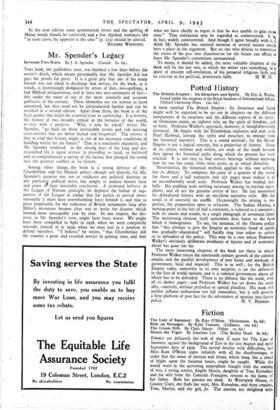Potted History
The British Empire : Its Structure and Spirit. By Eric A. Walker. Issued under the auspices of the Royal Institute of International Affairs. (Oxford University Press. 12s. 6d.) A BOOK entitled The British Empire : Its Structure and Spirit might well be expected to be set out in chapters on the different components of its structure and the different aspects of its spirit: on Dominion status, on indirect rule, on the spirit of freedom, and so fortn. Professor Walker's approach, however, is straightforwardly historical. He begins with the Elizabethan explorers and ends with Pearl Harbour, leaving the spirit and structure to emerge from the historical narrative. This is a sound method ; for the British Empire is not a logical concept, but a projection of history. Many of its critics, without and within, are wide of the mark because they ignore the historical paths along which the present has been reached. It is not easy to find correct bearings without knowing how far one has come, froin what point, or in which direction.
Nevertheless, the historical method, applied to this vast subject, has its defects. To compress the „story of a quarter of the world for three and a half centuries into 237 pages must reduce it to an uncomfortably small scale. Professor Walker has worked skilfully. His pudding lacks nothing necessary among its myriad ingredients, and all are the genuine article of fact. He has moistened his dehydrated history with an emollient narrative style. Bet the result is of necessity no soufflé. Occasionally the mixing is imperfect, the proportions open to criticism. The Indian Mutiny, a turning-point in the fate of half a continent, is reduced to a sentence ; with its causes and results, to a single paragraph of seventeen lines. The moistening element itself sometimes does harm to the facts which it homogenises. To say, for instance, of the Ottawa policy that "this attempt to give the Empire an economic bond of union was gradually "abandoned" will hardly ring true either to critics or to defenders of the policy. This may be a ease where Professor Walker's obviously deliberate avoidance of figures and of economic detail has gone too far.
The most interesting chapters of the book are those in which Professor Walker traces the nineteenth century growth of the colonial empire and the parallel development of new forms and Methods of government, local and imperial. This is as well ; for the British Empire today, somewhat to its own surprise, is on the defensive in the lists of world opinion, and it is colonial government above all which has to be defended. There is no defence like the truth, with all its darker pages ; and Professor Walker has set down the truth ably, concisely, without prejudice or special pleading. His work will neither inflame enthusiasm nor lull conscience but it will provide a firm platform of past fact for the adventures Of opinion into future
policy. H. V. Honsost.






















 Previous page
Previous page